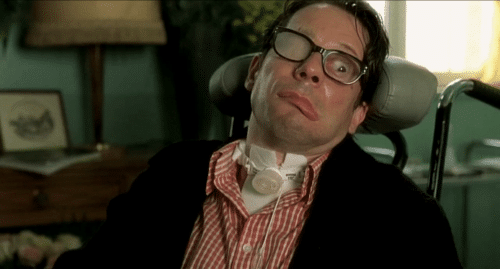Assisted Dying – can we live without it?
I remember reading of Jean-Dominique Bauby, editor of French fashion magazine Elle. Dominique suffered a stroke aged 42. Paralyzed, speechless and only able to move his left eyelid, he used this rudimentary movement to dictate an entire book. Here he describes an occasion where he is taken out in his wheelchair with his two children. It’s Father’s Day …
“… While I have become something of a zombie father, Theophile and Celeste are very much flesh and blood, energetic and noisy. I will never tire of seeing them. ….As we walk Theophile dabs with a Kleenex at the thread of saliva escaping my closed lips. His movements are tentative, at once tender and fearful as if he were dealing with an unpredictable animal. As soon as we slow down Celeste cradles my head in her bare arms, covers my forehead with noisy kisses and says over and over “you’re my dad, you’re my dad” as if in an incantation. Today is Father’s Day. Until my stroke we had felt no need to fit this made-up holiday into our emotional calendar. But this time we spend the whole of this symbolic day together, affirming that even a rough sketch, a shadow, a tiny fragment of a dad, is still a dad”.
It is heart-rending, and it made me realise that the value of a human life is sometimes only fully realised by those who love us.
Even a tiny fragment of a dad is still a dad
But the heartache extends in both directions.
Well-known campaigner Bob Cole ended his life at the Swiss Dignitas Clinic in Switzerland in 2015. He suffered from aggressive lung cancer, bent double in pain, and crouching like an animal. “That’s no life”, he said, “I should be able to die with dignity in my own country, in my own bed. The law needs to change”.
Cole was followed by many others suffering terrible and incurable illnesses but there are even more who, due to the shattering extent of their condition, could not make the journey to Switzerland. So why can’t a person of sound mind, in terrible suffering and close to death end their own life? After all, we wouldn’t allow an animal to suffer in this way.
That’s the position of UK parliamentarian Baroness Meacher who, on October 25th, achieved a second reading of her bill in the House of Lords to provide adults who are terminally ill help to die. The bill is strongly supported by others, including Lord Field of Birkenhead, who is himself terminally ill. Field is now in a hospice and was too ill to attend parliament, so his words were read out by Baroness Meacher.
At the same time, doctors at the British Medical Association (BMA) voted this Summer to change their position on assisted dying from “we are against” to “we are neutral”. The motion was narrowly carried by 49% for, 48% against.
What’s wrong with this bill?
In some cases, there may be nothing wrong with it, BUT changing the law leads to further and further changes. In 2002 when Euthanasia was legalised in Holland, nobody imagined that, some years later, a mother suffering severe tinnitus and with two children would be legally killed. There’s always a “slippery slope”.
I believe it’s valid to compare this bill with the 1967 abortion act. This also was initially brought in as a last resort for exceptional cases. However, today, we are all aware of the high rates of abortions at various stages of pregnancy. Euthanasia may start off as the exception but runs the high risk of becoming normalised or even expected of people in some situations. Imagine a situation where an elderly or terminally person feels under pressure to relieve their family and friends of the financial and emotional cost of caring for them.
But there is a second, simpler reason why we should not pass this bill: people change their minds. There are cases of dementia sufferers who willingly sign a directive to be euthanised. However, when their situation deteriorates to a point where the directive is about to be applied, they change their mind or are no longer able to confirm their wishes in either direction. Even people with all their faculties change their minds: Alison Davies wanted to die for 10 years but had a change of heart even though her suffering continued.
As the above Guardian article says: “legalising euthanasia might resolve one ethical conundrum, but it opens a can of others – most importantly, where the limits of the practice should be drawn”. And, in a recent letter to The Times, experts from hospitals and universities in Oregon and Canada, where assisted dying has been legal for years, highlight a problem of unintended coercion.
Why is this a discussion for our time?
3 reasons:
- Medical technology has caused huge improvements in our care, but there are consequences. For example between 1991 and 2001 UK life expectancy increased by 2.2 years. But in the same period, healthy life expectancy increased by only 0.6 years. Essentially, there is an ever-growing period at the end of our lives during which we can expect to be alive but chronically ill*.
- Aging populations – the baby boomers, born just after the war, is the biggest generation ever. They are now entering old age in vast numbers. Looking forward, the UK Government Actuary Department calculates that in 70 years there will be thousands of Britons aged over 110*.
- Choice – we live in a world where we expect to choose everything, my kids’ school, my supermarket, my church, my pension provider. Death is the last thing we cannot choose ….. but we try.
Western countries that allow Euthanasia include Holland, Belgium, Luxembourg, Switzerland, and several US states. Spain passed their assisted dying law last year.
Does the Bible offer an answer?
In this case, I don’t think it does, and there are purposeful, conscientious people of faith on both sides of the debate (although most seem to oppose any change in the law). One thing we must never do is oversimplify the discussion. It’s very easy to quote clichés like “life is sacred”, but this is unhelpful, simplistic, and also open to the question, “why should such a statement only cover the length of life?” In other words: why is only quantity of life sacred? Why isn’t quality of life also sacred? Such statements can also minimise people’s suffering, (and, in any case, “life is sacred” is not a phrase that occurs in the Bible. Similarly, the commandment “thou shalt not kill” was never meant for situations where a person is asking to die.
‘life is sacred’ is not a phrase that occurs in the Bible
What we do get from the Bible is the utmost need for compassion and that giving compassion will often be at our cost. All sides in this debate agree that the law should minimize suffering and maximize wellbeing. But we must choose between the rock and the hard place. I think our current laws on assisted dying are imperfect but as good as they can be. Here assisted dying is illegal … yet often possible eg through increased dosage of morphine. In addition, to date, several hundred Britons have broken UK law by helping relatives go to Switzerland for an assisted death, but none have been prosecuted. Lastly palliative care is not perfect, but it is often effective in minimising at least physical suffering.
The slippery slope always starts with a small shift, changing people’s perception slightly, so that we begin to view those with devastating illnesses differently, and they begin to view themselves differently.
We can live without that.
* Figures from Is There a Christian Case for Assisted Dying, Paul Badham
If you found this article useful, try Why does God allow bad things to happen?
This post was updated and re-purposed from an original post on this website published in 2015
This article was also published by Premier Christianity




Excellent article. I once heard Baroness Finlay talk on the subject. To me the unintended coercion / unspoken pressure argument one is strong, especially for vulnerable elderly. The emphasis on palliative care and relieving suffering seems right to me.
“We can live without it” is one of the best conclusions I have seen in this debate. Thanks for your insight Chris!
Wow
This is heavy and interesting discussion
Thanks mate
Very interesting indeed!
It is barbaric to allow people to suffer with no hope of recovery. The law should be changed immediately to allow people to die with dignity.
Yes it is indeed cruel Neil — and so is encouraging people to opt to die when that isn’t really their wish, or allowing them to feel that somehow they have a duty to die
Who says that would happen? Seems highly unlikely to me!
Very helpful Chris.
And as you say a pertinent issue for our time
An interview and article on this subject is also at
https://drsunil.com/podcast/podcast-017-the-last-taboo-subject/
Thanks Sunil — your podcast raises many new questions I didn’t have chance to get to, not least “what does it mean to die well?” On the lighter side, I also like the Woody Allen quote!
Why is Al Qaeda more compassionate than pro-lifers?
The 9/11 hijackers got to die instantly.
Not everyone agrees with this article — and that’s OK. For a heated disagreement see comment thread on https://www.facebook.com/chris.goswami7/posts/10204812233656108?pnref=story
UPDATE Sept 13: This blog was initially written before the debate in UK Parliament on Sept 11 and has undergone slight changes to reflect the situation afterwards.
In the Parliamentary debate there was an understanding that more harm than good would be done to vulnerable people if an Assisted Dying law was passed. It was defeated by a large majority (330 votes to 118). I am impressed that Parliment debated this responsibly and conscientiously instead of responding to emotive headlines that appeared in the days before the debate..
Here in Canada, the Supreme Court of Canada has ruled that patient-assisted suicide is legal. My concern is that people with medical issues with disabilities where they can’t communicate, will have their life terminated without their consent. Then, there is the larger question of what constitutes life. My stepfather signed a Do not Resuscitate order because my mother had suffered her third heart attack. The neurologist said there was 90% brain death. My stepfather made the painful decision to let her die with dignity. She was taken off life support. No matter what stand a person takes on the issue… Read more »
Taking off life support is not euthanasia, see point 2278 of Catchism of Catolic Church.
2278
Discontinuing
medical procedures that are burdensome, dangerous, extraordinary, or
disproportionate to the expected outcome can be legitimate; it is the refusal
of “over-zealous” treatment.
Here one does not will to cause death; one’s inability to impede it is merely
accepted.
The decisions should be made by the patient if he is competent and able or, if
not, by those legally entitled to act for the patient, whose reasonable will
and legitimate interests must always be respected.
Certainly agree with the polarization of views Kevin — very emotive and compelling arguments on both sides
wow… i am honestly sad and thankful i got to read this.. i live in a country where we value life so much and that euthanasia is not even an option even to the “dying of the dyings”…what i am saying is it breaks my heart ….thanks for sharing …
Thanks for taking the time to read and give your thoughts – tell me which country do you live in?
i am from the Philippines… ever heard about it?
Of course 🙂
Hi Chris,
As you know I am catholic and thank God, I do not have any doubts about euthanasia. It is easy for my as the You shall not kill commandment. It is suicide. My faith is simple on that matter, any person who committed suicide goes to hell, that is it. I looked into link you post about clerics view on euthanasia, it is really sad for person calling themselves as Christians go against “You shall not kill”
Interesting view, very clear — and I take your point Marek. My view is that in a tiny number of cases Euthanasia MIGHT actually be justified BUT changing our law will go much further than this .… if we somehow “normalise” assisted killing then the side effects are infinitely worse than any issues we solve. Thanks.
Chris, It cannot be justified for Christian, but It can for non beliver. Non beliver cannot wait for miracle, Christian can. Christian have hope, faith and knows that his God also has suffered.
Thanks — yes I get that. I do feel however that the “thou shalt not kill” commandment you start with cannot be universal, all places, all times An easy example is that we know in the Old Testament God does allow and even instructs killing. So for me it is an important principle but there may be occasions when this principle must give way to another principle.
However we are in agreement that we do not agree with Assisted Dying laws being introduced to the UK.
I do agree with euthanasia but also feel in some instances that it is a subject that needs a lot of discussion, for instances euthanasia when people have dementia, that is now very much in the publicity here in Holland. My mother in-law had dementia and she was of a generation who probably did not know about how to ask for and get euthanasia so she went into a nursing home and had good days and bad days and very often when we had visited here, we felt very saddened by the way she was but for me it would… Read more »
Good to get your perspective as someone who has lived with Euthanasia laws for 10+ years. I see that you are still generally in favour. I think key points you mention are that people can change their minds, and the possibility that very old or very sick people could feel they are “a problem to be taken care of” to their families. For me that is enough to say “no”. Thanks Nanda.
But what do you do with the person who is forced to live through excruciating pain every day? Every day is a day they don’t want to be there. Their quality of life is zero and there’s no way out?
hi chris think your discussion is well researched and balanced. The abortion act was originally brought in as a last resort, for exceptional cases. We are all aware of the high rates of abortions at various stages of pregnancy…yet there are accounts of parents who went against advice and continued with their pregnancy to have a baby they would not be without. Euthanasia may start off as rare but runs the high risk of becoming the norm or in some situations expected. Imagine the situation where loving family members disagree on euthanasia , where elderly people or the terminally or… Read more »
Hi Elaine, I think the comparison with abortion laws is a valid one. Whatever people’s views on abortion it is clear to me that the law was brought in for exceptional cases, “with safeguards”, but today it is not exceptional. Thanks
hi chris think your discussion is well researched and balanced. The abortion act was originally brought in as a last resort, for exceptional cases. We are all aware of the high rates of abortions at various stages of pregnancy…yet there are accounts of parents who against advice and continued with their pregnancy to have a baby they would not be without. Euthanasia may start off as rare but runs the high risk of becoming the norm or in some situations expected. Imagine the situation where loving family members disagree on euthanasia , where elderly people or the terminally or severely disabled feel… Read more »
Great piece Chris.
Not an easy one. If we look at the achievements of Steven Hawking, clearly we have to go with the adage of ” where there’s life. And I completely agree with the selfish tinnitus case.
That said we also have old people with cronic illness where maybe it would be kinder to let them slip away to their maker.
It’s not a call I want to make but one thing is for sure. It shouldn’t be easy — a la mobile vans ! ( but in the case of Katy Hopkins I’ll make an exception — joke )
Its a really tough issue. I don’t disagree that in a very few cases, it might be kinder to let someone “slip away”. I think that is mostly achievable under our existing laws as stated in the article. Changing the law to explicitly enable euthanasia does start to make it too easy in my view.